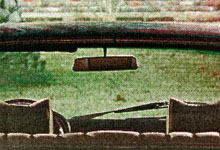
Tracks
Arcade Fire: "The Suburbs"
(2010)
By Conrad Amenta | 28 May 2010
It shouldn’t come as much of a surprise that Arcade Fire, whose politics truck so solidly in the populist that their appeal is rooted in wordless chanting and identification with children, would move their spotlight from the paranoia of Neon Bible (2007) to that great bastion of adolescent alienation, the suburbs. It’s downright anachronistic at this point; what little symbolic value the suburbs retain as polar exemplar of racial and class-based segregation is easily complicated by looking at gentrification in any major city and being a young person who wants to raise a family. If you’re looking for a soft, white, middle-class Republican to hate, he’s as likely to live in the condo down the street from the university as the increasingly cosmopolitan, far-flung gated communities. And besides: most of this has been summarily and exhaustively described by David Byrne—whose Talking Heads are unsurprisingly an Arcade Fire influence—back in 1978, when, on “The Big Country” he said, “I wouldn’t live there if you paid me.” What else, after that, need possibly be said?
So it’s hard to know if Win Butler and co. have grown cajones for the ironic or if they’re just being their old nostalgic, sentimental selves. If it’s irony, who is it aimed at? And I have doubts that Arcade Fire’s particular brands of anthem can even bear the weight of the cynical post-modern, that they’re equipped for much more than sincerity and bombast. More interesting, then, to ask what this band is acting nostalgic for. “By the time the first bombs fell / We were already bored” Butler sings, as if a return to Cold Ward escapism—the well from which the suburb’s divisiveness in part drew—could de facto legitimize all of the baroque feeling of the band’s formula. Neon Bible, with its call-in gimmick and titular imagery, seemed like it might go the route of conflating commercialism and faith, a topic at which one imagines the great expanse of post-20th Century American literature staring and yawning. But that album’s territory ended up far more nebulous, more psychological and insecure than its marketing suggested. One hopes the same for The Suburbs— that this band, who once seemed on the cusp of capturing some felt and essential sense of cultural exhaustion and renewal, aren’t falling back on the mores of a leftie superiority. One hopes that perhaps “The Suburbs” is an honest question posited by a singer who just turned 30 and is confronting a notion of adulthood often irreconcilable with being in an important rock band. One hopes, because raising dukes against paper tigers serves only to weaken oneself in the eyes of us followers.





